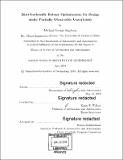| dc.contributor.advisor | Karen E. Willcox. | en_US |
| dc.contributor.author | Kapteyn, Michael George | en_US |
| dc.contributor.other | Massachusetts Institute of Technology. Department of Aeronautics and Astronautics. | en_US |
| dc.date.accessioned | 2018-11-28T15:42:20Z | |
| dc.date.available | 2018-11-28T15:42:20Z | |
| dc.date.copyright | 2018 | en_US |
| dc.date.issued | 2018 | en_US |
| dc.identifier.uri | http://hdl.handle.net/1721.1/119304 | |
| dc.description | Thesis: S.M., Massachusetts Institute of Technology, Department of Aeronautics and Astronautics, 2018. | en_US |
| dc.description | Cataloged from PDF version of thesis. | en_US |
| dc.description | Includes bibliographical references (pages 81-83). | en_US |
| dc.description.abstract | Deciding how to represent and manage uncertainty is a vital part of designing complex systems. Widely used is a probabilistic approach: assigning a probability distribution to each uncertain parameter. However, this presents the designer with the task of assuming these probability distributions or estimating them from data, tasks which are inevitably prone to error. This thesis addresses this challenge by formulating a distributionally robust design optimization problem, and presents computationally efficient algorithms for solving the problem. In distributionally robust optimization (DRO) methods, the designer acknowledges that they are unable to exactly specify a probability distribution for the uncertain parameters, and instead specifies a so-called ambiguity set of possible distributions. This work uses an acoustic horn design problem to explore how the error incurred in estimating a probability distribution from limited data affects the realized performance of designs found using traditional approaches to optimization under uncertainty, such as multi-objective optimization. It is found that placing some importance on a risk reduction objective results in designs that are more robust to these errors, and thus have a better mean performance realized under the true distribution than if the designer were to focus all efforts on optimizing for mean performance alone. In contrast, the DRO approach is able to uncover designs that are not attainable using the multi-objective approach when given the same data. These DRO designs in some cases significantly outperform those designs found using the multi-objective approach. | en_US |
| dc.description.sponsorship | Supported in part by AFOSR, Dynamic Data Driven Application Systems Program grant FA9550-16-1-0108 Defense Advanced Research Projects Agency EQUiPS program, award W911NF-15-2-0121 New Zealand Marsden Fund grant contract UOA1520 SUTDMIT International Design Center | en_US |
| dc.description.statementofresponsibility | by Michael George Kapteyn. | en_US |
| dc.format.extent | 83 pages | en_US |
| dc.language.iso | eng | en_US |
| dc.publisher | Massachusetts Institute of Technology | en_US |
| dc.rights | MIT theses are protected by copyright. They may be viewed, downloaded, or printed from this source but further reproduction or distribution in any format is prohibited without written permission. | en_US |
| dc.rights.uri | http://dspace.mit.edu/handle/1721.1/7582 | en_US |
| dc.subject | Aeronautics and Astronautics. | en_US |
| dc.title | Distributionally robust optimization for design under partially observable uncertainty | en_US |
| dc.type | Thesis | en_US |
| dc.description.degree | S.M. | en_US |
| dc.contributor.department | Massachusetts Institute of Technology. Department of Aeronautics and Astronautics | |
| dc.identifier.oclc | 1061861069 | en_US |
